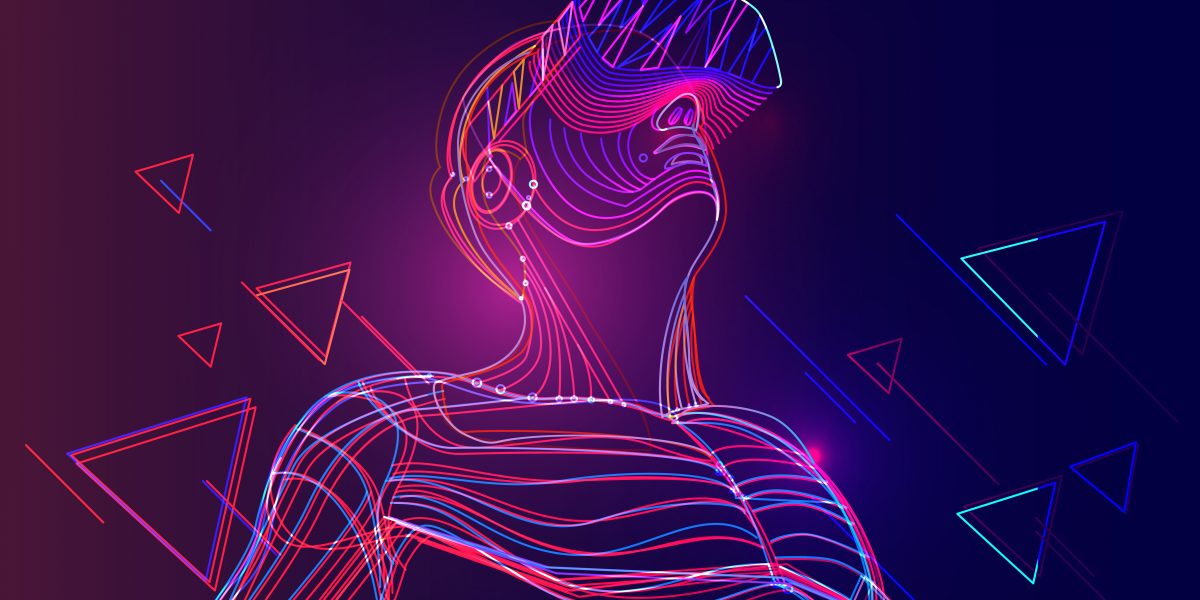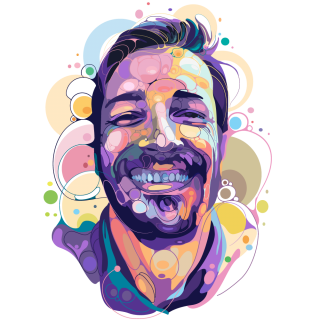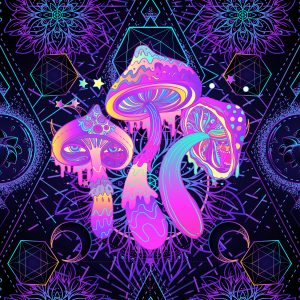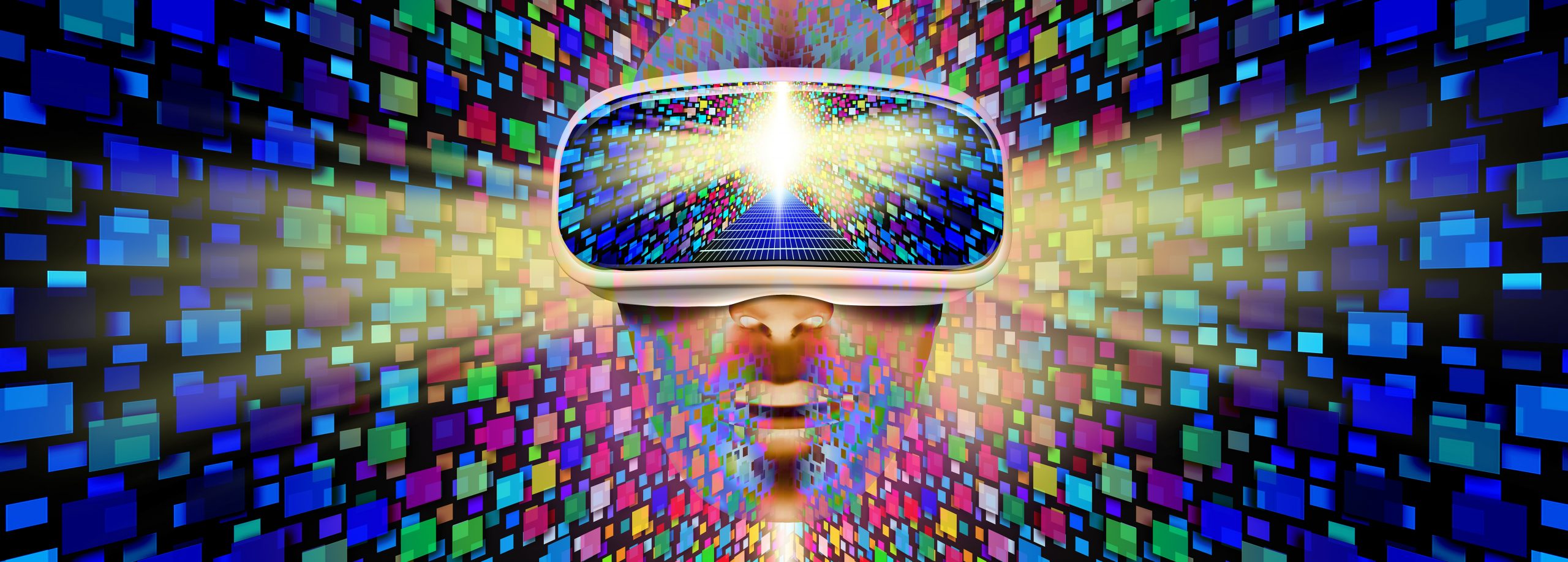
in this article
- The psychedelic origins of VR.
- Overlapping concepts, ideas, experiences and areas of concern.
- Psychedelics, the Metaverse, the Zuck and some closing thoughts.
Are you 18 or older?
Please confirm that your are 18 years of age or older.
You are not allowed to access the page.



Psychedelics and virtual reality both have the potential to show us other worlds and break the constraints of our conscious experience. Since its conception, Virtual Reality has been inextricably linked to the psychedelic experience. The early discussion around VR was directly related to psychedelic culture and the capacity of psychedelics to drastically alter our perceptions.
While some in the technological community are reluctant to acknowledge these deep connections between what could be seen as two forms of consciousness-altering technology, many in the psychedelic community embrace them. Philosopher and ethnobotanist Terence McKenna said, “the only difference between computers and drugs is that one is too large to swallow” [1]. VR is seen as a potential means of introducing people to psychedelics safely and possibly even as a substitute for or augmenting the psychedelic experience.

Timothy Leary, another famed psychedelic advocate (and former Harvard psychologist), advocated for the creation of what he called “Cyberdelics”, the synthesis of psychedelic drugs and electronics. He believed that with this combined technology, we would have the ability to “reprogram the mind”. He even went as far as altering his popular catchphrase “turn on, tune in, drop out” to “turn on, boot up, and jack in”. In theory, this is a wonderful idea, but unfortunately, the technological landscape is far from simple. Leary could never have predicted the internet, social media, and the power it has over our brains. I think we can safely say that technology can change our minds; there’s no question of that.
Multiple Silicon Valley tech start-ups, artists, and scientists are working on VR applications that are either directly or tangentially related to psychedelics and the psychedelic experience. For example:
French filmmaker Jan Kounen’s “Ayahuasca (Kosmik Journey),” artist Sander Bos’ “Visionarium,” and University of Sussex researchers’ “Hallucination Machine”.
While these works are powerful, they do not replicate all aspects of the psychedelic experience.
Despite their differences, it appears virtual reality and psychedelics are set to collide.
Psychedelics
A class of psychoactive substances that produce changes in perception, mood, and cognitive processes. Psychedelics affect all the senses, altering a person’s thinking, sense of time, and emotions. They can also cause a person to hallucinate—seeing or hearing things that do not exist or are distorted. [1]

The Parallels
Both alter perceptual experience, “notably visual processing.” DMT, for example, “is a potent hallucinogen for immersing users into unique and vivid mental landscapes.” The entire purpose of VR is to “immerse individuals into visual environments that transcend the limits of their physical self.” [3]
Both have the “capacity to evoke awe” which is a critical factor in the therapeutic potential of these technologies, “specifically by promoting unitive experiences as well as feelings of sacredness and gratitude.” [4]
Chemistry
Drugs alter brain chemistry, and therefore our conscious experience is changed along with it. VR can only modify the things we perceive, not perception itself. While it may be able to imitate the visual and auditory effects of hallucinogens, visual and auditory distortion is just a surface element of the psychedelic experience. So, perhaps psychedelics and virtual reality are not quite as similar as they seem.
Religious/Sacred Concerns
Psychedelics have been used ritually for thousands of years. Many believe them to be a gift from the gods, and that using them is a spiritual act, rather than a technology to be exploited. The culture of Silicon Valley is so far removed from this, with profit being a major factor in the development of these psychedelic applications. And for some – I would go as far as to say most – users of hallucinogens, the prospect of putting on a headset and entering a virtual space whilst on these substances, would be unappealing, to say the least.
Ego Death/Safety
In healthy users, or those seeking spiritual release from their problems, the prospect of ego death and the dissolution of reality can be an exciting prospect or even the goal of the experience. This can, however, be dangerous. The risk of psychosis in individuals with existing mental health conditions is real, especially in environments without an adequate focus on set and setting. Virtual Reality could have some potential in imitating some of the powerful effects of psychedelics in a manner safe for at rick users to gain at least some benefit.
Psychedelics are impartial chemicals that affect the brain in a set way for a set amount of time and have extremely limited addiction potential or health risks in general. While on its surface VR might appear to be similar in this regard, the truth is murkier. The potential issue with VR is its ongoing and inevitable synthesis with social media. We already know that social media companies, Facebook, Twitter, TikTok, purposefully make their products addictive. When you combine this with a technology somewhat analogous to a psychedelic, you get something potentially terrifying. Currently, VR cannot fully mimic a hallucinogen. But perhaps not forever. The rate at which technology improves may eventually result in virtual realities indistinguishable from the real world.
The true synthesis of social media and VR is the Metaverse – “a virtual-reality space in which users can interact with a computer-generated environment and other users.” The attention economy on which social media platforms rely is contingent on creating maximally addictive and predictive systems for their users to interface with. This has obvious detrimental effects on their users. The complete immersion in virtual space will surely only compound the issue, as people’s lives become even more consumed by their virtual experiences.
When used correctly, psychedelics introduce us to alternate realities, sometimes even other worlds, without additional technology or outside influence. Suppose our society continues to break down the barriers between reality and fiction. In that case, they may even be a means to prepare our minds for this transition to an ever more virtual existence. Periodically removing ourselves from ‘reality’ may paradoxically be a means to train ourselves to keep a handle on what actually is real.

It’s difficult not to see Zuckerburg’s Metaverse as a Matrix-like dystopian future in which a small elite class of tech billionaires extract huge wealth mining the attention of the masses.Perhaps a wise course of action would be to employ both technology and chemistry, not in combination but in sequence. Virtual Reality experiences can safely introduce potentially vulnerable individuals to aspects of the psychedelic experience, then careful use of psychedelics can open and prepare our minds for a multi-reality future.
Virtual reality and the Metaverse are coming, and psychedelics have been integral in both conceiving and creating it. It stands to reason then that psychedelics will be important for the continued development of this technology and our interactions with it.
What do you think, do psychedelics and VR have a future together, will one influence the other, can the psychedelic experience cure us of some of the ills of modern social media?
David Blackbourn | Community Blogger at Chemical Collective
David is one of our community bloggers here at Chemical Collective. If you’re interested in joining our blogging team and getting paid to write about subjects you’re passionate about, please reach out to David via email at blog@chemical-collective.com

Welcome to Chemical Collective.
Create an account to earn 200 welcome points.
Already have an account? Sign in


Check out our Community Blog and get involved with the conversation. You will be awarded 50 x ChemCoins for each comment up to a limit of 250 total ChemCoins.


Have you purchased any of our products? Reviews and reports are so important to the community. Share your honest opinion, and we’ll reward you with 50 ChemCoins for each review!


Every time you complete an order with us, you’ll be awarded ChemCoins for each Euro spent.
Welcome to Chemical Collective.
Create an account to earn 200 welcome points.
Already have an account? Sign in

Earn commission every time someone makes a purchase through your link.
When you become an affiliate, you will be allocated a unique link to share with your friends, followers, subscribers, or Aunt Susan.
You can choose to payout the commission earned once per month, or save it up to receive on a rainy day! Commission earned is 5% of the total order value per referral.
Contact us to join the Chemical Collective family and become an affiliate.
share your toughts
Join the Conversation.
Chemical Collective Online VR
Coming soon on Steam !
Nah? too crazy? could be a VR chat like enviorment with the niche theme we all love here.
Also, just an opinion, metaverse sucks, we can probably do a better job with some good lucy, friends and engineers around!
Definitely want to try VR on a psychedelic some day
Testé et approuvé . L’expérience était incroyable surtout avec les jeux coloré !
Tested and approved . The experience was amazing especially with the colorful games!
Cool
An interesting read right there. Thanks David for opening this topic. I have been playing around with cardboard VR and an Asmr audio recording to create an immersion where a person could perceive the unrhythmical nature of city life and a rhythmical nature of… nature. I got inspired by the possibility of using VR for purposes not connected to the profit realm, but to use the “new” technology to open up perception. I think there is definitely potential there. Technology isn’t positive or negative, it is how we use it that determines it’s polarity. The problem, in my view, is that humans have not evolved enough to predominately use it in a good way.
It will be interesting to see how VR coupled with an AI experience modulator that has immediate inputs from your body (brain waves, heart beat rate etc.) would function.